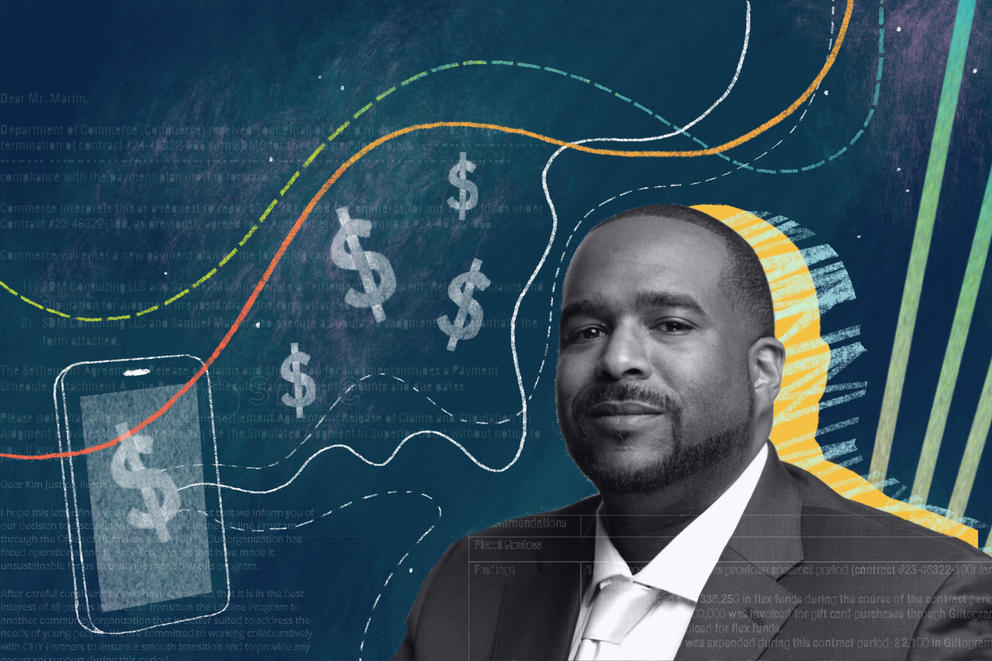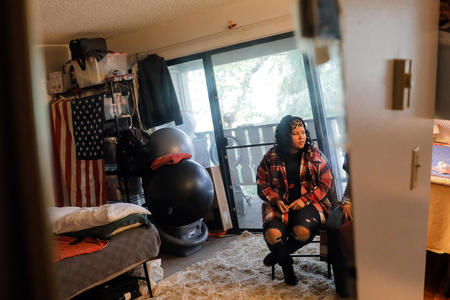Instead, the state has ordered its contractor to pay back hundreds of thousands of dollars as the $1.5 million Lifeline pilot program to support at-risk youth collapsed under scrutiny, just weeks after a Cascade PBS and Youth Today report last fall detailed service delays and questionable financial practices.
Lifeline abruptly suspended its cash assistance and service referral operations in early December. The program’s website now requires a password to access, and emails to its intake specialists and case manager bounce back. Its phone line is dead too.
“This decision, taken with the utmost consideration, is necessary,” an online notice stated, “but brings with it a sense of deep regret due to the inconvenience and disruption it may cause.”
The program contractor, lobbying firm SDM Consulting, did not respond to multiple requests for comment. But documents obtained via public records request show SDMC ultimately walked away from its contract in the months after the state’s Office of Homeless Youth demanded the firm repay more than $330,000 in what officials called “mis-spent [sic] funds.”
The state Department of Commerce, which oversees the Office of Homeless Youth, defended SDMC’s work to reporters last fall, just before appearing to have launched a review of its financial practices. In November, the department ordered SDMC to repay hundreds of thousands of dollars in improperly invoiced payments and put the firm on a payment plan, with a first installment of $97,900 due in January.
SDM Consulting’s founder and CEO Samuel D. Martin missed that payment, records show. Commerce then put Martin on a revised payment plan, with the first installment of $19,487 due in mid-February, and threatened to file suit.
Whether Commerce has recovered any money remains unclear. Commerce did not answer questions from Cascade PBS about whether Martin had made any payments to date or whether Commerce had pursued legal action.
“We are in the process of reaching resolution on this matter,” spokesperson Penny Thomas responded by email. “As such, we cannot speak to the specifics in most of your questions.”
Thomas added that Commerce is “well along in the process of securing a new nonprofit contractor” to run Lifeline. She declined to name the new contractor or provide a timeline.
Martin did not respond to a detailed list of emailed questions for this story. A follow-up email several days later received an automatic response that Martin was out of the office. When Cascade PBS called Martin, he immediately hung up.
The Lifeline promise
The ideal version of Lifeline WA looked something like this: Lifeline offered a “no-wrong-door access point” for case management, financial assistance and other support for youth who had gone through state systems, like foster care or juvenile detention.
To request help, young people could call Lifeline or fill out a form on its website. Within 72 hours, Lifeline would help address their problem — the threat of eviction, a car repair — before it escalated into crisis. For anyone 18 to 25 years old, Lifeline could also provide “flex fund” cash support for short-term needs, such as a month or two of rent. Ultimately, Lifeline would prevent homelessness and foster independence.
In reality, Lifeline turned out differently.
In December 2022, the Office of Homeless Youth selected SDMC, an Olympia lobbying firm that counted youth advocacy organizations among its clients, to build the pilot program and operate it. It granted the firm $672,500 for the first half of 2023, on a reimbursement basis. It soon renewed the contract with another $790,875 in funding through 2025. The firm had to pay its expenses up front, then invoice Commerce.
From the start, the program lagged, with delays in creating a phone line and updating its website to make services more accessible to young people. While tasked with serving youth across the state, Lifeline rolled out services centered in Spokane County alone, with promises to expand to other counties in the future.
Martin acknowledged the slow pace, telling Cascade PBS, “Our approach to project launch was purposeful and deliberate.” He added, “We opted for a gradual start to proactively identify and address potential challenges.”
In one regard, however, SDMC moved quickly.
Shortly after signing its contract with Commerce, the firm sent Commerce monthly invoices that frequently exceeded $100,000. Those bills included tens of thousands of dollars per month earmarked for the needs of clients that Lifeline didn’t yet have.
In March 2023, for instance, before Lifeline had a website or had helped a single person, the firm billed Commerce for $115,296. Of that, it requested $61,375 for “flexible funding” and “concrete goods” including “Bus passes, food, clothing vouchers etc.”
Records indicate Commerce signed off on these invoices despite its contract explicitly prohibiting “payments in advance or in anticipation of services or supplies to be provided.”
SDM Consulting’s initial Lifeline contract ended on June 30, 2023, and any unspent funds would expire along with it. By the end of June, SDMC had invoiced Commerce for every penny of the initial $672,500 grant, including $336,250 in flexible funds and gift cards.
Martin, a former foster youth himself, told Cascade PBS last fall that he billed Commerce because he wanted to build up a nest egg of funding for Lifeline.
Martin called it “proactive efforts in financial planning,” telling Cascade PBS via email: “This foresight streamlined our processes and set the foundation for a post-launch phase that runs seamlessly.” Without this approach, he said, Lifeline would have lost the ability to support hundreds of young people.
At that point, Lifeline had likely helped just a handful of clients. The exact figure remains unclear, but receipts and spending records obtained through public records requests suggest that Lifeline had provided financial assistance to four people by the end of June. Commerce told Cascade PBS they could not provide documentation specifically showing how many people Lifeline had helped because SDMC had not submitted such records, despite a requirement to do so.
According to Martin, $226,250 went to a designated account in SDMC’s credit union, for flexible funding to cover future clients’ needs. He estimated the money could support 400 people if their requests averaged $500 each.
Martin said he spent the remaining $100,000 at a gift-card company called Giftogram, under the firm’s name.
But a representative from Giftogram told Cascade PBS via email this month that SDMC had “purchased a much smaller amount” than $100,000. The representative said they could not specify exactly how much, citing customer privacy.
Despite months of amassing hundreds of thousands of dollars to purportedly secure Lifeline’s financial future, SDMC started sending “intent to pay” notices – effectively IOUs – in the fall. Email records show Lifeline and SDMC employees referencing “intent to pay” practices as early as September.
Martin began issuing these notices to vendors in lieu of large payments that he couldn’t immediately send, a former SDMC employee, who requested anonymity out of fear of retaliation, explained. If a client requested several thousand dollars in back rent to avoid eviction, for instance, Lifeline might first send the landlord an “intent to pay” instead of the payment itself.
Commerce’s oversight
The Office of Homeless Youth and Department of Commerce appeared to notice SDMC’s spending issues only after Cascade PBS began asking questions last fall regarding the firm’s practices around Lifeline. In a September interview, Kim Justice, the executive director of the Office of Homeless Youth, seemed surprised when told of SDMC’s advance spending. Despite describing herself as “pretty involved” in Lifeline, she said she would have to look into it.
She said during the same interview that she thought Lifeline was “going well.”
In an email response at the time, Thomas, the Commerce spokesperson, told Cascade PBS: “There may be a misunderstanding in your conversations with SDMC about ‘remaining’ flex funds.” She added, “All paid invoices have been supported by documents that ensure funds are being spent according to the contract.”
A couple months later, Commerce changed its tune.
In mid-November, the Office of Homeless Youth concluded that SDMC had misspent $331,281 and would need to return the money. That amount totaled all of the flexible funding and gift card amounts for which SDMC had billed Commerce in the first half of 2023, minus the documented several thousand dollars spent on clients.
By Martin’s own math, that money could have helped 662 young people.
Records show Commerce then amended its contract with SDMC to include a payment plan and a requirement that the firm provide detailed spending documentation. It also held off on reimbursing SDMC for mounting Lifeline expenses of $164,000 from August through November — which included $30,000 in flexible funding and $134,000 in operational and administrative costs, invoices show — until the firm agreed to the payment plan and submitted documentation for its incurred expenses. SDMC completed both tasks throughout December.
But it was too late. That month, SDMC quietly shuttered Lifeline, posting on its website that as of Dec. 1, Lifeline was on “an indefinite suspension.” It offered no explanation, telling clients with pending requests to “monitor your email for specific updates.” It remains unclear how many clients Lifeline assisted before closing. Records show that from July through November, Lifeline documented cash assistance or gift cards to about 20 young people.
Contract terminated
As Lifeline sat on the verge of permanent closure, Martin acknowledged recent struggles, but suggested SDMC could redeem itself. “We have had a significant strain over the last few months and want to better manage cases that we already have,” he emailed Commerce in early December.
Martin also told Commerce that Lifeline had stopped taking new cases but planned to complete any open cases by Dec. 15. He implored officials to resume its reimbursement because he said Lifeline needed the money for flex fund requests — the very purpose for which he claimed to have previously set aside $226,250.
“We currently have rent payments we need to make for young people who are actively relying on us and facing eviction,” he wrote on Dec. 13, days after Commerce allowed him to submit invoices again. “We have already had to deny several flex fund requests due to our inability to replenish our flex fund. This has also caused harm to the young people we are actively aiming to serve.”
This time, Commerce said it would not reimburse SDMC until it had carefully reviewed those invoices.
“I understand the urgency,” Justice emailed Martin in response. “However, in order to move forward with payment we need to ensure that we have all the necessary documentation.”
Within a week, Commerce had reimbursed SDMC more than $125,000.
When the deadline for SDMC’s first repayment – $97,900 – arrived on Jan. 20, Martin informed the Office of Homeless Youth that he couldn’t pay.
“Unfortunately, due to circumstances beyond my control,” he wrote, “I am currently experiencing a delay in receiving a considerable income which is expected in 2023.”
Commerce subsequently revised the payment plan, making the first installment of $19,487 due in mid-February. A spokesperson for Commerce did not answer a question from Cascade PBS about whether SDMC had made any payments to date.
Martin initially planned to revive the Lifeline, telling Commerce in January that he had restarted back-end operations. That, too, fell through.
On Jan. 23, he wrote Commerce a letter saying that SDMC had faced “operational and financial challenges that have made it unsustainable for us to continue managing this program.” Two days later, Commerce terminated his contract. Lifeline’s closure largely escaped notice.
At the end of December, Martin won the Seattle Kraken’s “Hero of the Deep” award, according to his Instagram account. The award honors “inspiring individuals who are doing outstanding work to transform lives, enable resiliency, and uplift and unite our community across the Pacific Northwest.”
“Helping my community and trying to make a difference is core to my being. What’s hard is that I ain’t felt like a hero lately,” Martin wrote on Instagram. “I’ve failed a lot lately, learned some hard lessons and have been back to the drawing board more than I’d like. But we not giving up [sic]. We get more locked in. We continue to do right by ppl. And in the end the results will speak for themselves.”
Get the latest investigative news
A newsletter for resources, data and behind-the-scenes insight into investigative efforts.






